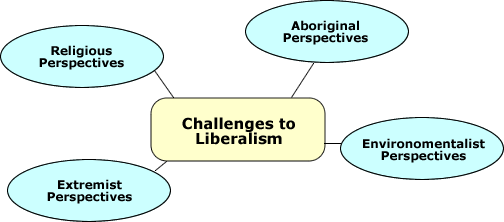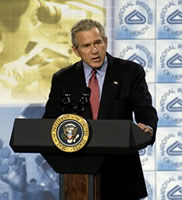Lesson Seven: Challenges to Liberalism With Alternative Thought
| Site: | MoodleHUB.ca 🍁 |
| Course: | Social 30-2 RVS |
| Book: | Lesson Seven: Challenges to Liberalism With Alternative Thought |
| Printed by: | Guest user |
| Date: | Wednesday, 31 December 2025, 5:04 PM |
1. Introduction
Challenges to Liberalism with Alternative Thought
Issue Question: Is resistance to liberalism justified?
- appreciate how citizens and citizenship are impacted by the promotion of ideological principle
- appreciate that individuals and groups may adhere to various ideologie
- examine the extent to which modern liberalism is challenged by alternative ideas
- evaluate the extent to which resistance to liberalism is justified
Duration: 1 block (80 mins + homework)
Challenges to liberalism come from many different perspectives. Some groups feel they need to protect and support their own beliefs and values from those of liberalism. By protecting and supporting their beliefs and values, they challenge liberalism. People hold certain beliefs based on their own individual and collective values. Many of these values come from their culture and their deeply held beliefs. What happens when some of these deeply rooted ideas oppose the values of modern liberal ideology? Many aspects of society, such as Aboriginal collective thought, religious perspectives, extremism, and environmentalism, are challenging liberal ideology constantly. When some perspectives differ in ideology from liberal governments, some people may feel they need to protect and support their beliefs and values. By protecting and supporting their beliefs and values, people challenge liberal ideology. Whether these perspectives are striving for self-government, religious laws, traditional roles of women, or sustainability not economic freedom, people are all using the institutions in liberal societies to challenge liberal ideology. Ideological challenges to liberal ideology may come from Aboriginal perspectives, religious perspectives, environmentalist perspectives, and extremist perspectives.

2. Lesson 4.7.1 Aboriginal Perspectives
Challenges to Liberalism: Aboriginal Perspectives
 One key aspect to Aboriginal culture is a belief in the value of the group or collective over
the individual. Many Aboriginal groups have values reflecting liberalism. For example, the Haudenosaunee promoted equality, and the ability of individuals to bring their concerns to the assembly of chiefs. However, Aboriginal survival often depended
upon group or collective values. The liberalist value of self-interest goes against collective Aboriginal values.
One key aspect to Aboriginal culture is a belief in the value of the group or collective over
the individual. Many Aboriginal groups have values reflecting liberalism. For example, the Haudenosaunee promoted equality, and the ability of individuals to bring their concerns to the assembly of chiefs. However, Aboriginal survival often depended
upon group or collective values. The liberalist value of self-interest goes against collective Aboriginal values.

Another important aspect of traditional Aboriginal thought is the idea that all people must live in harmony with the land and respect it. Aboriginal peoples traditionally have been dependent on the land and all that exists on it. They believe their existence is of equal importance to that of the plants and animals. Many Aboriginals believe in a spiritual connection to the land. Therefore, the land cannot be owned by any one individual. Land is for all to use.
On the other hand, liberal capitalism regards land as something that can be bought and sold, including any resources located on the land.

© CREATISTA/shutterstockImage

As a result of this basic difference in the approach to the land, Aboriginal peoples and the Canadian government have had ongoing land claim conflicts. Right from the start, settlers immediately began dividing land up amongst themselves while the very concept of land ownership was foreign to Aboriginal peoples.
Similarly, the Aboriginal desire for self-government includes the desire to make their own decisions regarding their land, economic well-being, and natural resource use. This also includes protecting First Nations, Métis, and Inuit people cultures, languages, and education. This goes against the federal government's handling of these issues, which has not always been in the Aboriginal people's best interests.
3. Lesson 4.7.2 Religious Perspectives
Challenges to Liberalism: Religious Perspectives
Religious beliefs can include the idea that the best interest of the group is more important than self-interest. Some groups believe that people should live communally and share the profits of their work. For example, the Hutterites in Canada live together and give everything to the community; they keep nothing for personal gain.
Some religions believe that men and women are fundamentally different and that there should be different laws according to gender.
Religions can also have a belief in a higher power that tells people what to do. This can happen through answers to prayer or guidelines in a religious book such as the Christian Bible, the Jewish Torah, or the Muslim Koran.

4. Lesson 4.7.3 Environmental Perspectives
Challenges to Liberalism: Environmentalist Perspectives
Many people are deeply concerned about the environment. They believe that a materialistic lifestyle could harm the future of the planet. They believe that we need laws to protect endangered species, to limit pollution and greenhouse gases, and to limit the destruction of the forests. However, these laws could limit people's individual rights, including the right to own private property. Environmental laws are usually collective in nature because they limit what individuals can do by attempting to protect the environment for the common good of all.

5. Lesson 4.7.4 Extremist Perspectives
To be an extremist, one's belief system must lie outside of the normal spectrum of beliefs. Extremism is the belief in actions that are considered unacceptable morally, socially, or politically.


© U.S. National Institute of Health President George Bush Jr.
Here is what happened to one airline passenger in an American airport:
"There I was, walking in stocking feet with my hands up. I watched the line of people slowly being herded along as armed guards patted us down. I had to take off my sweater so the female guard could pat me down. Then I went into a chamber where powder came out of the walls. I could see the fear in everyone's faces. And to think, I was in the so-called land of the free. We have given up our freedoms in the name of security, but I don't feel very safe right now."
The attacks on the World Trade Center in New York on September 11, 2001, ignited the War on Terror campaign and led to the 2001 invasion of Afghanistan and Iraq in 2003 plus a series of foreign policies known as the Bush Doctrine.
Foreign policy under the Bush administration after 2001 emphasized the right of the United States to secure itself aggressively from countries that harboured or gave aid to terrorist groups. This approach is associated with the ideals of international intervention to secure American national interests.
"We will pursue nations that provide aid or safe haven to terrorism. Every nation, in every region, now has a decision to make. Either you are with us, or you are with the terrorists. From this day forward, any nation that continues to harbor or support terrorism will be regarded by the United States as a hostile regime."
—George W. Bush in his September 20, 2001, address to the United States Congress
In 2001, as a result of the terrorist challenges to western liberalism, the liberal democracy of the United States passed the Patriot Act, which allowed American authorities to
search all communications such as telephone and e-mail conversations
records such as medical, financial, and any other records
ease restrictions on intelligence gathering in the U.S.
increase the powers of law enforcement and immigration authorities in keeping or deporting immigrants for suspected terrorist related acts
In a country that prided itself on civil liberties, under pressure from extremist groups like al-Qaeda, the U.S. Patriot Act did much to limit those freedoms.
The Canadian government passed similar legislation in 2001, the Canadian Anti-Terrorism Act.
"The war against terror leaves us afraid, and fearful people will listen to governments who tell them they can only be safer when government is more powerful. Benjamin Franklin said that the man who would surrender liberty for a little safety deserves neither. As liberals we need to be on our guard against claims that we can be more secure by being less free."
—Graham Watson, Member of European Parliament, 2004An area of extremism has been the Taliban in Afghanistan and Pakistan. The Taliban is an extremist group that once ruled Afghanistan in a totalitarian manner. After the World Trade Center was destroyed by the extremist group al-Qaeda on 9/11, 2001, the United States removed the Taliban from power by military force. The Taliban had been allowing al-Qaeda and its leader Osama bin Laden to train their extremist forces there. Canada and many other NATO forces supported the United States in pushing out the Taliban. However, the Taliban have been able to mount a brutal campaign against NATO coalition troops.
During 2008, in the Swat Valley of Pakistan, the Taliban shut down schools. Through an agreement with the Pakistani government, the schools for girls did reopen. But there is still immense pressure on girls not to go to school. Girls face serious harassment as well in Afghanistan. In 2008, some girls were attacked with acid, causing serious injury to their faces for attending school. During the Taliban's rule, girls were banned from attending school.
6. Conclusion
Throughout history man has questioned the common knowledge and ways of doing things. Without this curiosity we may still believe the world is flat and that Kings and Queens have the divine right of God to rule all men, women and children. The main question raised in this lesson, considering Aboriginal collective thought, religious perspectives, extremism, and environmentalism, is to what extent is resistance to liberalism justified??
A final thought from Albert Einstein,
"Learn from yesterday, live for today, and hope for tomorrow. The important thing is not to stop questioning."
